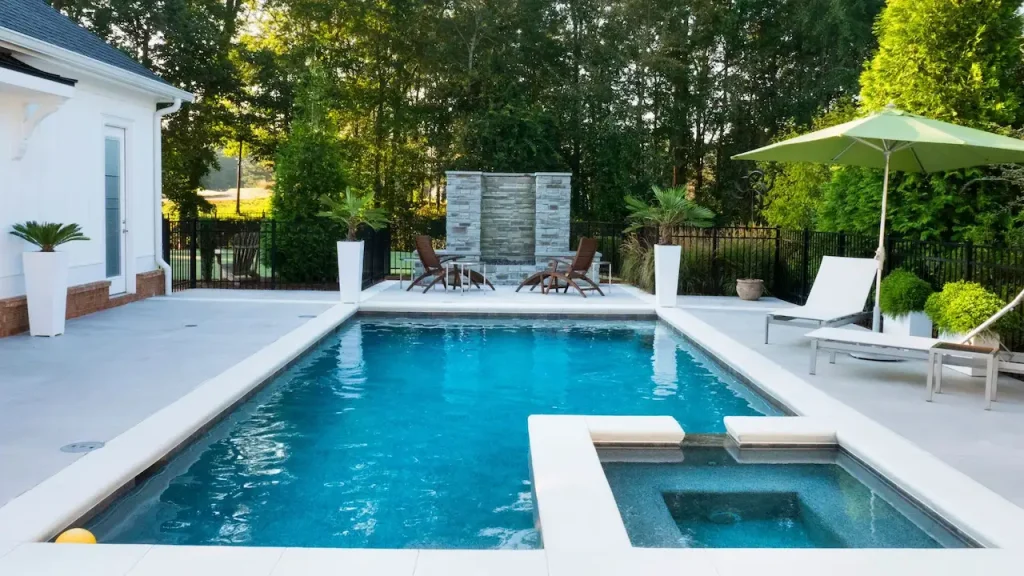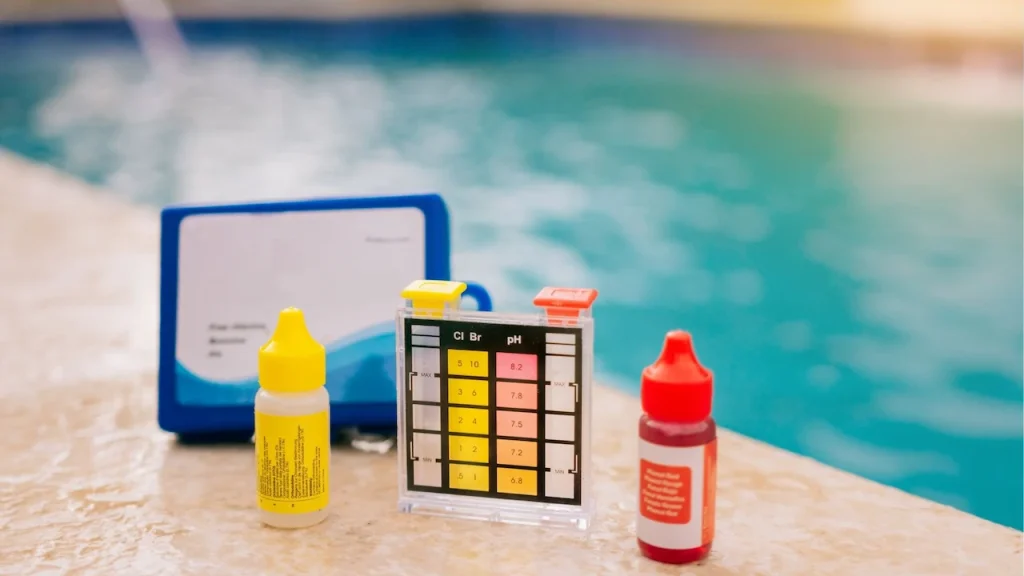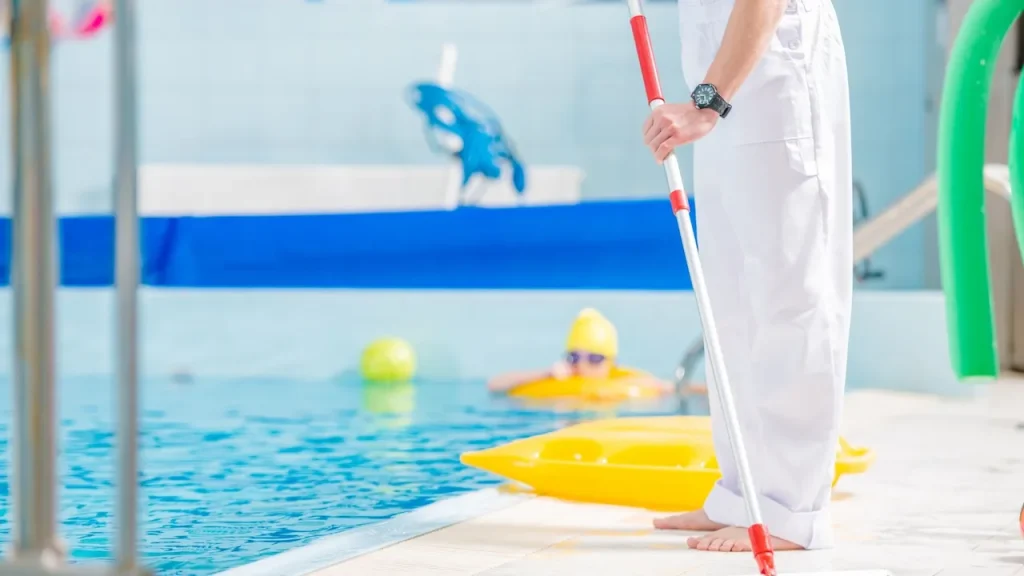Let’s dive into the benefits and differences between these two popular options, with Plunge Pools Brisbane as your expert solution provider to guide you in making the best decision.
In this article, we’ll explore the key aspects of chlorine and mineral plunge pool systems, comparing their advantages, disadvantages, and how each impacts your overall pool experience. We’ll also discuss factors like pool design, installation, maintenance, and health benefits to help you make an informed decision about your plunge pool’s sanitation system.
Table of Contents
ToggleTwo main options: chlorine and minerals
When it comes to plunge pool sanitation, there are two main options: chlorine and minerals. Choosing the right system is crucial for ensuring a safe and enjoyable swimming experience.
What is Chlorine Pool?
Chlorine is the traditional method of sanitising pools and is still widely used for plunge pools today. Liquid chlorine is commonly added to the water to kill bacteria and algae, ensuring the water remains clean and safe for swimming. Let’s get into the advantages and disadvantages of chlorine pool.

Advantages of chlorine pool
1. Effectiveness in killing bacteria and algae
Chlorine is highly effective in eliminating harmful bacteria and algae that can accumulate in plunge pools. Its ability to quickly sanitise your pool water makes it a reliable option for keeping your pool hygienic.
2. Lower initial cost
Chlorine pool systems are generally more affordable to set up compared to mineral pool systems. For homeowners on a budget, the lower initial investment may be an attractive advantage.
Disadvantages of chlorine
1. Eye and skin irritation
One of the most common complaints about chlorine pools is the irritation they can cause to the eyes and skin. Prolonged exposure to chlorine can leave swimmers with red, itchy eyes and dry, sensitive skin.
2. Strong chemical smell
Chlorine’s distinctive odour can be overwhelming, especially in a smaller plunge pool. Many people associate this chemical smell with discomfort, which can detract from the enjoyment of a relaxing swim.
3. Childhood memories of discomfort
For many, the scent of chlorine brings back memories of stinging eyes and itchy skin during childhood swimming lessons. This discomfort can make chlorine systems less appealing to those seeking a more luxurious and pleasant pool experience.
what is Mineral Pool?
Mineral water pools are gaining popularity as an alternative to traditional chlorine pools, offering a different approach to keeping water clean while improving the overall swimming experience. Mineral pool systems can be based on crystal salts or crystal magnesium, each providing a range of benefits.
How does Saltwater Pool Chlorinator work?
Saltwater pool chlorinators use an electrolytic cell to sanitise your swimming pool by introducing a small amount of salt into the water. This process converts the sodium chloride in the salt into chlorine, effectively eliminating bacteria and other harmful microorganisms that can cause illness. This is a gentler way than traditional liquid chlorine. Salt water reduces the harshness of the water while still providing effective sanitation.
Similarities between salt and mineral pool system
Both saltwater pools and magnesium systems offer gentler water conditions compared to traditional chlorine. They are also less likely to cause skin or eye irritation, making them more comfortable for swimmers.

Advantages of mineral pool systems
1. Gentler on Skin, Hair, and Eyes
One of the biggest selling points of mineral pools is how soft the water feels. The minerals can soothe dry or sensitive skin and reduce irritation in the eyes and nose. No more post-swim itching or red eyes.
2. Health and Wellness Benefits
Minerals like magnesium are known to help with muscle recovery, stress relief, and even skin hydration. Swimming in a mineral pool can feel like a mini spa session every time you take a dip.
3. Low Chemical Smell
Mineral pools use far less chlorine than traditional systems. That means no overwhelming chemical smell sticking to your skin or hair after a swim. You can often walk out of the pool and skip the shower.
4. Eco-Friendlier Option
With less reliance on harsh chemicals, mineral pools tend to be better for the environment. You’re releasing fewer chlorinated compounds into the air and water system, making it a more sustainable option for eco-conscious families.
Disadvantages of Mineral Pool
1. Higher Upfront Cost
Mineral pools require specialised systems, like a mineral chlorinator and specific mineral blends. This makes the initial installation more expensive than traditional chlorine pools.
You’ll need to invest in proper equipment and quality minerals to get the full benefits—which can make it tough for those on a tighter budget.
2. Ongoing Maintenance is Still Needed
While mineral pools often promote “low maintenance,” they aren’t totally hands-off. You still need to:
- Check mineral levels
- Balance pH and chlorine
- Occasionally shock the pool
It’s less maintenance than traditional pools, but it’s not a set-and-forget solution.
3. Limited Product Availability
Unlike chlorine pools, where you’ll find endless products at every pool shop, mineral pool supplies are less common. If your system uses a specific blend of minerals, you may need to order online or go through specialty retailers.
This can slow things down when you’re troubleshooting or just need a quick top-up.
4. Compatibility Issues
Not every pool setup is easily converted into a mineral system. Depending on your current equipment, you may need to upgrade or replace parts, which adds to the overall cost and complexity.
Comparison of Water Quality Chlorine vs Mineral
When it comes to choosing between chlorine and mineral pools, several key differences can dramatically influence your swimming experience. Let’s dive into the essential aspects of water quality for each type.

1. Chemical Composition
At the core of their differences lies their chemical makeup. Chlorine pools primarily use chlorine as the main sanitising agent, which is effective but can lead to a more sterile feel. On the other hand, mineral pools combine various natural minerals such as magnesium and potassium—alongside lower levels of chlorine. This distinction results in significantly different water qualities, with mineral pools generally providing a more balanced and enjoyable swimming experience.
2. Feel and Texture
Swimmers often rave about the luxurious feel of mineral pool water. The minerals, especially magnesium, lend a softer and silkier texture to the water, making it more pleasant for swimming. In contrast, chlorine pools can sometimes feel harsher against the skin, particularly for those who spend extended periods in the water. The difference in feel can be a game-changer for frequent swimmers seeking comfort and relaxation in their pool experience.
3. Skin and Eye Comfort
One of the standout advantages of mineral pools is their gentleness on the skin and eyes. They tend to be less irritating, making them an excellent choice for individuals with sensitive skin or conditions like eczema. Chlorine pools, when not properly balanced, can cause dryness, red eyes, and even hair damage. For families or swimmers who prioritise skin and eye comfort, mineral pools offer a noticeable edge.
4. Odour
We’ve all encountered the distinctive “pool smell” associated with chlorine pools. Chlorine smell is an odour is actually a result of chloramines—compounds formed when chlorine reacts with contaminants like sweat and sunscreen. In contrast, mineral pools boast a milder odour, if any at all, thanks to their lower chlorine levels and the calming presence of minerals. This can make the swimming environment feel fresher and more inviting.
5. Clarity and Appearance
Both types of pools can achieve excellent water clarity with proper maintenance. However, mineral pools often have a reputation for producing water that has a slight shimmer or sparkle due to their mineral content. This aesthetic quality not only enhances the visual appeal but can also create a more inviting atmosphere for swimmers.
6. Health Benefits
Beyond comfort, mineral pools—especially those rich in magnesium—may offer additional health benefits. These minerals can be absorbed through the skin, potentially aiding in muscle relaxation and stress relief. In contrast, while chlorine pools effectively sanitise, they don’t provide the same wellness benefits associated with mineral pools, making the latter an attractive option for health-conscious swimmers.
7. Environmental Impact
Finally, consider the environmental aspect. Mineral pools generally have a lower environmental impact due to their reduced chemical usage. With less reliance on chlorine, fewer chemicals are introduced into the water and subsequently released into the environment, making mineral pools a more eco-friendly choice.
In summary, while both chlorine and mineral pools can deliver clean and safe swimming experiences, mineral pools often excel in terms of comfort, feel, and potential health benefits. Ultimately, the choice between the two comes down to personal preferences, budget considerations, and specific pool requirements. Whether you lean towards the soothing properties of a mineral pool or the traditional reliability of chlorine, each option has its unique charm that caters to different swimming experiences.
Design Considerations Chlorine vs Mineral
When choosing between chlorine and mineral systems for your plunge pool, it’s important to consider the design implications. The size of your pool can impact which system is most suitable, as larger pools may require more robust sanitation methods. Additionally, the choice of materials, such as fibreglass, can affect the compatibility with different sanitation systems. Custom plunge pool options allow for tailored solutions that best suit your specific needs and preferences.
Installation and Maintenance Chlorine vs Mineral
The setup process for mineral systems may be slightly more complex than traditional chlorine systems, but the ongoing maintenance needs are often simpler. Mineral systems typically require less frequent adjustments and can be more stable over time, potentially reducing the overall maintenance effort required to keep pool clean and safe.

Health and Comfort Chlorine vs Mineral
When considering the impact on skin, eyes, and hair, mineral systems generally offer a more comfortable experience. The potential health benefits of magnesium, including improved skin hydration and muscle relaxation, make mineral systems an attractive option for those prioritising wellness in their swimming experience.
Conclusion
Choosing between a chlorine and mineral plunge pool system depends on your individual choice of pool. While chlorine systems offer effective sanitation at a lower initial cost, mineral systems provide a more luxurious and potentially healthier swimming experience.
Consider factors such as water quality, maintenance requirements, and health benefits when making your decision. Ultimately, both systems can provide a clean and enjoyable plunge pool, but mineral systems, particularly those using magnesium, offer unique advantages that may make them worth the investment for many pool owners.
What’s Next to do?
Now that you’ve got a better understanding of the water systems available for your plunge pool visit our next article about When to Use Fibreglass for a Plunge Pool? Discover the situations where fibreglass is the smartest choice, from quick installs to long-term durability and low maintenance.
People Also Ask
What is the difference between chlorine and mineral pools
Chlorine pools rely on chlorine as the main sanitiser to keep the water clean. Mineral pools, on the other hand, use a blend of natural minerals—like magnesium and potassium—combined with a lower level of chlorine. This creates gentler water that’s softer on the skin, eyes, and hair, making the swim more comfortable for most people.
Are mineral pools worth it?
Yes. Mineral pools offer a more comfortable and gentle swim, with less irritation to your skin and eyes. The added minerals, like magnesium, may help with muscle relaxation and wellness. Plus, they use fewer harsh chemicals, making them a more eco-friendly option.
How do mineral pools work?
Mineral pools clean the water using a mix of natural minerals and a small amount of chlorine. The minerals are usually added through a cartridge or system, creating a softer, healthier swim with less chemical exposure.
How do traditional chlorine pools work?
Traditional chlorine pools use chlorine to disinfect the water, killing bacteria and keeping it safe to swim in. To stay clean and balanced, they need regular maintenance and consistent chlorine levels.
What are the benefits of a mineral pool?
Mineral pools offer softer water, less irritation for your skin and eyes, and a more natural feel. You may also get health perks from mineral absorption, like muscle relaxation. Plus, they have milder smells and need fewer chemicals to maintain.
Can you swim in a mineral pool every day?
Yes. Mineral pools are gentle on the skin and eyes, making them safe and comfortable for daily swimming.
How much maintenance do mineral pools require?
Mineral pools need regular care, like checking pH and mineral levels. But with fewer harsh chemicals, they’re often easier to manage than traditional chlorine pools.
Can you convert a chlorine pool to a mineral pool?
Yes. You can convert a chlorine pool to a mineral pool by adding a mineral system. It may require draining and refilling the water. For best results, talk to a pool professional.




